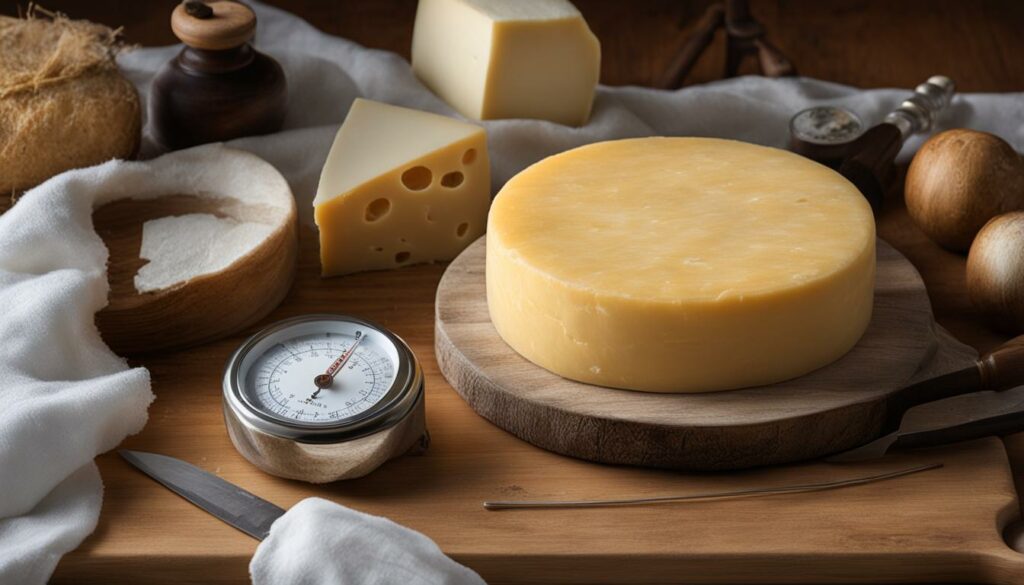Welcome to the world of Cotswold Cheese – a hearty and flavorful cheese that is sure to delight your taste buds. Also known as “Pub Cheese,” Cotswold Cheese combines the creamy goodness of Double Gloucester with the zesty kick of chive and onion. It’s a popular choice in England, often enjoyed alongside hard-crusted bread and a glass of rich, dark ale.
If you’re ready to tantalize your palate with this delectable cheese, you’re in luck! Cotswold Cheese is available for purchase online, making it convenient to bring this delicious treat into your home. But if you prefer to savor the experience in person, you can also find Cotswold Cheese at specialty cheese shops near you.
Whether you choose to buy Cotswold Cheese online or explore a local cheese shop, you’ll discover a cheese that is not only versatile but also a true delight to your senses. From its smooth and crumbly texture to the harmonious blend of mellow cheese and powerful vegetables, Cotswold Cheese is a culinary masterpiece that you don’t want to miss out on.
So, get ready to embark on a cheese-lover’s journey and indulge in the incredible flavors of Cotswold Cheese. Whether you’re spreading it on bread, melting it on grilled chicken, or incorporating it into your favorite recipes, Cotswold Cheese is sure to become your new favorite. Don’t wait any longer – start your Cotswold Cheese adventure today!
Cotswold Cheese Varieties and Tasting Notes
When it comes to Cotswold Cheese, you can expect a delightful blend of flavors and textures that are perfect for any cheese lover. This unique cheese is primarily made with Double Gloucester cheese, expertly combined with chive and onion to create a harmonious balance of taste.
The smooth, cheddary texture of Cotswold Cheese sets it apart from other varieties, making it a pleasure to indulge in. Its mild, less sharp flavor, compared to well-aged cheddar, makes it a versatile choice that suits various palates. With Cotswold Cheese, you can savor a cheese that effortlessly melts, making it ideal for serving on slices of warm, crusty bread.
When it comes to appearance, Cotswold Cheese boasts a rich golden yellow to orange color that adds a vibrant touch to any cheese board. Whether you enjoy it on its own or pair it with other cheeses, Cotswold adds a creamy and mellow profile that complements the softer, milder flavors on the board.
What makes Cotswold Cheese even more exciting is its availability in both pasteurized and unpasteurized varieties. Additionally, if you’re seeking a more mature flavor, aging Cotswold Cheese for at least a month in the refrigerator can intensify its taste and provide a deeper flavor experience.
So, whether you’re hosting a gathering or simply treating yourself, exploring the varieties of Cotswold Cheese will open up a world of delicious possibilities. The unique combination of mellow cheese and powerful vegetables in Cotswold Cheese promises a taste sensation that is sure to satisfy even the most discerning cheese connoisseurs.

Cotswold Cheese Recipe and Pairing Suggestions
If you’re looking to explore the delicious flavors of Cotswold Cheese, you’re in for a treat! This versatile cheese can be enjoyed in a variety of ways, from classic pairings to creative recipes. Here are some ideas to inspire your culinary adventures:
1. The Ploughman’s Lunch
Experience a taste of traditional British pub culture with “the ploughman’s lunch.” This simple yet satisfying snack features a generous cut of Cotswold Cheese, paired with a home-baked bread roll, tangy pickled onions, and a refreshing pint of beer. The combination of the rich cheese, crusty bread, and zingy pickles creates a delightful symphony of flavors.
2. Melted on Grilled Meats
Take your grilled chicken or chops to the next level by adding a layer of melted Cotswold Cheese. The creamy, savory flavors of the cheese complement the smoky, charred notes of the meat perfectly. Simply melt a slice or two of Cotswold Cheese on top of your chosen grilled meats for an irresistible flavor boost.
3. Rich and Creamy Burgers
Elevate your burger game by incorporating Cotswold Cheese into your patties. The mellow, crumbly texture of the cheese melts beautifully and infuses the burger with a rich, creamy flavor. Whether you’re making beef, turkey, or veggie burgers, adding Cotswold Cheese will take them to a whole new level of deliciousness.
4. Gourmet Macaroni and Cheese
Indulge in the ultimate comfort food by using Cotswold Cheese in your macaroni and cheese recipe. The cheese’s smooth, cheddary texture creates a velvety sauce that coats the macaroni perfectly. The addition of the chive and onion flavors adds an extra layer of complexity to this classic dish.
5. Cheese-Filled Sandwiches
Upgrade your sandwiches with the delectable taste of Cotswold Cheese. Whether you’re making grilled cheese, paninis, or cold sandwiches, the creamy, flavorful cheese will take your creation to new heights. Pair it with your favorite deli meats, fresh vegetables, and condiments for a truly sensational sandwich experience.
With these recipe ideas and pairing suggestions, you can fully enjoy the unique flavors of Cotswold Cheese in a variety of ways. Whether you prefer traditional pairings or innovative recipes, this cheese is sure to impress your taste buds.

| Recipe/Pairing | Description |
|---|---|
| The Ploughman’s Lunch | A classic British pub snack featuring Cotswold Cheese, bread, pickled onions, and beer. |
| Melted on Grilled Meats | Enhance grilled chicken or chops with melted Cotswold Cheese for a creamy, savory twist. |
| Rich and Creamy Burgers | Add Cotswold Cheese to your burger patties to create indulgent, flavorful burgers. |
| Gourmet Macaroni and Cheese | Use Cotswold Cheese in your macaroni and cheese recipe for a decadent, cheesy delight. |
| Cheese-Filled Sandwiches | Elevate your sandwiches by filling them with the delightful flavors of Cotswold Cheese. |
Storing and Serving Cotswold Cheese
To ensure the freshness of Cotswold Cheese, proper storage is crucial. Follow these guidelines:
- Store Cotswold Cheese in the vegetable crisper of your refrigerator.
- Wrap the cheese in parchment or wax paper to allow for proper airflow.
- Loosely wrap the cheese in plastic wrap to protect it from moisture.
- Avoid freezing Cotswold Cheese, as it can alter the texture and affect its flavor.
When it comes to serving Cotswold Cheese, temperature plays a significant role in enhancing its flavors. Follow these steps:
- Before serving, take the cheese out of the refrigerator and allow it to come to room temperature. This typically takes about an hour.
- Allowing the cheese to reach room temperature helps to unlock its full flavor profile and ensures a smooth and creamy texture.
The shelf life of opened cheeses varies depending on their type. Here’s a general overview:
| Type of Cheese | Shelf Life (Opened) |
|---|---|
| Soft varieties | 5-7 days |
| Soft ripened cheese | 7-10 days |
| Blue cheeses | 2 weeks |
| Medium firm cheeses | 2-3 weeks |
| Firm/sharp cheeses | 4-6 weeks |
| Grating cheeses | 3-6 months |
Conclusion
Cotswold Cheese is a truly delightful English cheese, beloved for its unique combination of mellow cheese and flavorful chive and onion. This versatile cheese can be enjoyed in a variety of ways, from traditional pairings with bread and ale to adding a creamy twist to your favorite recipes. With its smooth texture and mild flavor, Cotswold Cheese is a must-try for cheese lovers.
Whether you prefer to purchase it online or at a local cheese shop, be sure to savor the rich, creamy flavors that Cotswold Cheese has to offer. Its harmonious blend of mellow cheese and powerful vegetables will surely tantalize your taste buds.
So, whether you’re looking to elevate your ploughman’s lunch, add a gourmet touch to your grilled meats, or create delectable cheese-filled sandwiches, Cotswold Cheese is the perfect choice. Discover the sheer joy of this exceptional cheese and let it become a new favorite in your cheese collection.
FAQ
What is Cotswold Cheese?
Cotswold Cheese, also known as “Pub Cheese,” is a hearty cheese that combines Double Gloucester with flavorful bits of chive and onion.
Where can I find Cotswold Cheese?
You can find Cotswold Cheese online or in specialty cheese shops.
How can I buy Cotswold Cheese?
Cotswold Cheese is available for purchase online or in specialty cheese shops.
How do I store Cotswold Cheese?
To keep Cotswold Cheese fresh, store it in the vegetable crisper of your refrigerator. Wrap it in parchment or wax paper, then loosely in plastic wrap.
Should I freeze Cotswold Cheese?
No, it is best to avoid freezing Cotswold Cheese as it can alter its texture.
How long does Cotswold Cheese last?
The shelf life of opened Cotswold Cheese varies depending on the type. Soft varieties last 5-7 days, soft ripened cheese lasts 7-10 days, blue cheeses last 2 weeks, medium-firm cheeses last 2-3 weeks, firm/sharp cheeses last 4-6 weeks, and grating cheeses last 3-6 months.
What are the tasting notes of Cotswold Cheese?
Cotswold Cheese has a smooth, cheddary texture and a mild, less sharp flavor compared to well-aged cheddar. It is golden yellow to orange in color.
How can I enjoy Cotswold Cheese?
Cotswold Cheese can be enjoyed with hard-crusted bread and a strong dark ale as part of a traditional British ploughman’s lunch. It is also delicious melted on grilled chicken or chops, and makes a great addition to burgers. It can be used in recipes that call for melted cheese, such as gourmet macaroni and cheese or cheese-filled sandwiches.
Can Cotswold Cheese be aged?
Yes, Cotswold Cheese can be aged for at least a month in the refrigerator.
How should I serve Cotswold Cheese?
Before serving, remove Cotswold Cheese from the fridge and let it come to room temperature for about an hour to enhance the flavors.
What makes Cotswold Cheese unique?
Cotswold Cheese is known for its harmonious blend of mellow cheese and powerful chive and onion flavors, making it a truly delightful English cheese.







